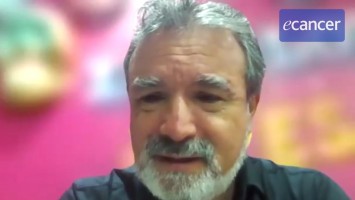WIN 2016
Affordable next generation sequencing to support decision making
Dr Elaine Mardis - Washington University, St Louis, USA
I presented a talk that really surveys the landscape of the use of next generation sequencing assays in clinical cancer medicine. So focussing on affordability which is really more about reimbursement models - how are people paying for these tests; accessibility – how are people able to access the tests? If they want to have their DNA tested from their cancer genome is that available to them? What are the different models for that? And then really focussing in on what are the data being used for, are we demonstrating a utility for patients to get their DNA tested, getting them onto clinical trials? Is there any clinical benefit of this testing? So that was really the sort of breadth of the talk that I gave.
How have you managed affordability?
It’s kind of interesting because, of course, in the US we have a strange, very different than the rest of the world, model with private insurers as well as the government providing some insurance coverage for patients. So really the government model for payment dictates what the private insurers do. So there has been some movement in that regard of late, and I talked a little bit about where that’s at in the fact that the CMS, which is our government agency for public health care dollars, is now covering some of these NGS panel tests for cancer patients and that, indeed, some of the US private insurers have now followed suit in also offering some payment for those. The payment is small compared to the price of most of the tests to conduct but it’s something and that’s really the minimum affordability, I guess you would say. There are companies in the US that will test, for a price that one can pay out of pocket, the cancer sample that has been obtained from a patient and so I discussed some of those and what they offer. And then there are obviously extreme examples such as very high net worth individuals who get a cancer diagnosis, make contact with someone who is very high profile in the cancer community and use that person’s network to really put together their own sort of private healthcare advisory group, a molecular tumour board of your own if you will. So those are the minimum to the absolute extremes.
How have new technologies impacted your work?
That’s the challenge in all of this is that large scale cancer discovery has told us a lot about the cancer genome much of which is, I would say, largely uninterpretable. So this is the challenge of sequencing through many genes or all genes is that we often have a lot of information but don’t necessarily know what to do with it, so this is a challenge. In that regard I highlighted some of the open source and openly accessible databases that we’ve put together with my group to really help coalesce information as it develops, almost in real time, using a crowd-sourcing model to have people from the oncology field actively contributing information into these databases so that others can benefit from it. This sort of broad scale, open source, open contribution model is a good one because our tendency is to silo this information or keep it private within our own healthcare systems whereas fairly rare mutations could be helpful to other groups that are finding them in one-off patients in understanding how other people have treated those mutations, whether they got a response or not etc., is all in the mix. So this is one way to stay on top of this incredible and ever developing source of information.
Do you think this information will improve personalised medicine?
We know that every patient’s genome stitches together different drivers and different factors to create cancer. So at one end of the spectrum it is highly personalised, at the other end of the spectrum we can learn a lot from each other and from the patients that are being individually cared for in a personalised way, if you will, at different places. So that’s really the emphasis that we’ve put on open data sharing.
What have you found interesting at this year’s WIN?
This is one of the reasons for coming to a meeting like this is just that there are so many perspectives that get offered up and importantly so. There’s a lot of information that is being exchanged here about not just doing NGS testing but the reality of clinical care of patients with targeted therapies versus immunotherapies; some really clever approaches to new therapeutic interventions such as the exosome work that we’ve been hearing about. Blood based monitoring is a huge area of interest for patients who are on therapies because it’s maybe a more immediate and more day to day way of monitoring their response or lack of response to a therapy etc. So it’s a very, very exciting time no matter what anyone says, just because there’s so much going on and so much potential to bring it together for individual cancer patients.








